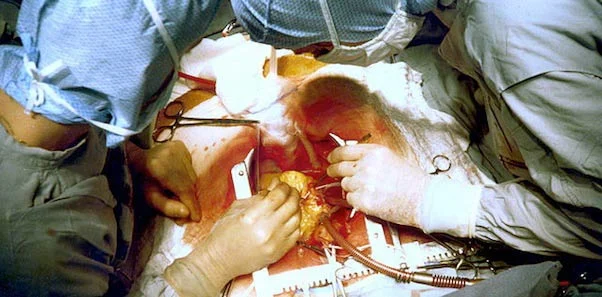Patients requiring coronary artery bypass graft (CABG) operations may be less likely to incur acute postoperative kidney injuries when they are not put on a heart-lung machine (off-pump procedure). However, kidney function one year after surgery is not better preserved compared to on-pump patients. These findings are reported in JAMA’s June 4 issue and will be presented at the European Renal Association-European Dialysis and Transplant Association Congress.
Heart Bypass and Kidney Injury
Acute kidney injury occurs in up to 30 percent of patients who undergo cardiac surgery. Acute injury in this study is defined as a greater than or equal to 50 percent increased concentration of serum creatinine, compared to the pre-operative baseline. The effect on long-term kidney function when a patient incurs a mild or moderate acute injury is unclear. So far, interventions designed to lessen the risk of acute kidney injury during heart surgery have not been shown to preserve kidney function in the long term.
The present research was conducted by Amit X. Garg, PhD and colleagues at Western University in London, Ontario, Canada. It represents a sub-study of the Coronary Artery Bypass Grafting Surgery Off- or On-pump Revascularisation Study (CORONARY). The researchers were interested in comparing the risk of acute kidney injury within 30 days of surgery, as well as evaluating kidney function one year later, for off-pump and on-pump patients. Loss of kidney function was defined as a minimum 20 percent loss in estimated glomerular filtration rate, compared to baseline.
Short-Term Off-Pump Advantage
Data were gathered from a total of 2,932 cardiac patients who were enrolled in the study prior to CABG surgery. The patients, from 63 sites in 16 countries, were randomised to either the on-pump or off-pump procedure. 30 days following surgery, fewer kidney injuries had been reported for the off-pump group (17.5 percent) compared with the on-pump group (20.8 percent). Further analysis revealed that patients with chronic kidney disease had a greater absolute risk reduction with the off-pump procedure compared with patients whose condition was not chronic.
After one year, there was no difference in the loss of kidney function between the off-pump and on-pump groups. The authors conclude that proof is still needed in order to show that an intervention, which lowers the risk of acute kidney injury within 30 days, also preserves kidney function in the future. The cost and potential adverse effects of such interventions, their development and testing, will factor into the ongoing discussion.
Latest Articles
Cardiology, bypass, cardiac surgery, JAMA, heart surgery, acute kidney injury, on-pump, off-pump, heart lung machine
Patients requiring coronary artery bypass graft (CABG) operations may be less likely to incur acute postoperative kidney injuries when they are not put on...










